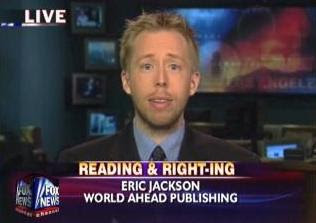Former congresswoman and still-liberal Pat Schroeder -- who holds the position of president of the American Association of Publishers --
claims that liberals read more books than conservatives because the latter "just wants a couple slogans: 'No, don't raise my taxes, no new taxes'...on every page." Schroeder was commenting on an AP-Ipsos poll that "found people who consider themselves liberals are more prodigious book readers than conservatives."
This strikes me as an ill-advised statement by Schroeder given that she's the head of a non-partisan trade organization that should not be alienating one-third of the country's population, especially since overall industry sales numbers remain flat. Of course, since liberals face the ever-present imperative of establishing their own intellectual superiority lest their belief system die,
* it's easy to understand why Schroeder shot off her mouth over this poll. But when one takes a moment to study the poll, problems with her flippant interpretation become apparent. To quote the AP again:
Among those who had read at least one book, liberals typically read nine books in the year, with half reading more than that and half less. Conservatives typically read eight, moderates five.
By slightly wider margins, Democrats tended to read more books than Republicans and independents. There were no differences by political party in the percentage of those who said they had not read at least one book.
When you break down these statements, it becomes apparent that Schroeder's claim is full of sound and fury but signifying nothing. To wit:
- Self-identified Republicans are just as likely to be book readers as self-identified Democrats.
- The average self-identified conservative book reader consumes about the same number of books per year (eight) as the self-identified liberal (nine). Given the poll's sample size, I doubt there is much statistical difference in these averages, and plus the averages don't control for page length, difficulty, etc.
- The breakdown Schroeder cites doesn't control for children. Parents are more likely to be conservative than adults who don't have children, and raising kids cuts into reading time. Controlling for this key variable would be necessary if we're to arrive at statistically accurate comparisons across groups.
- Similarly, the poll's breakdown doesn't control for religion. A second AP article on the poll noted "those who said they never attend religious services read nearly twice as many as those who attend frequently." But that doesn't mean that religious people (who are disproportionately conservative) don't read. To the contrary, the same article notes that the "Bible and religious works were read by two-thirds in the survey, more than all other categories." Religious people read, but they're reading the Bible. And frequent Bible reading is going to bring down the average quantity of books consumed per year.
- The poll can't surmise cause and effect. Liberals surely consume more indie art-house flicks, watch more hours of CNN, and are more likely to subscribe to the NYT. But these media convey a left-wing editorial perspective. Likewise, if the big New York publishers crank out a disproportionate number of liberal books, doesn't it follow that liberals will disproportionately buy them?
Simply put, the poll results Schroeder cites simply don't support the clumsy conclusion she is advancing. How ironic.
* To quote Thomas Sowell, "The welfare state is not really about the welfare of the masses. It is about the egos of the elites." Liberalism calls for top-down management of society by self-declared elites who desire to manage the lives of the ignorant little people who cannot take care of themselves and therefore tend to fall prey to the greedy, duplicitous "rich." But in order to make the case for being entrusted with lordship of society through centralization, elites must constantly assert their own intellectual superiority -- not just to advocate liberalism over competing ideas, but also to establish their bona fides.Labels: politics, publishing







